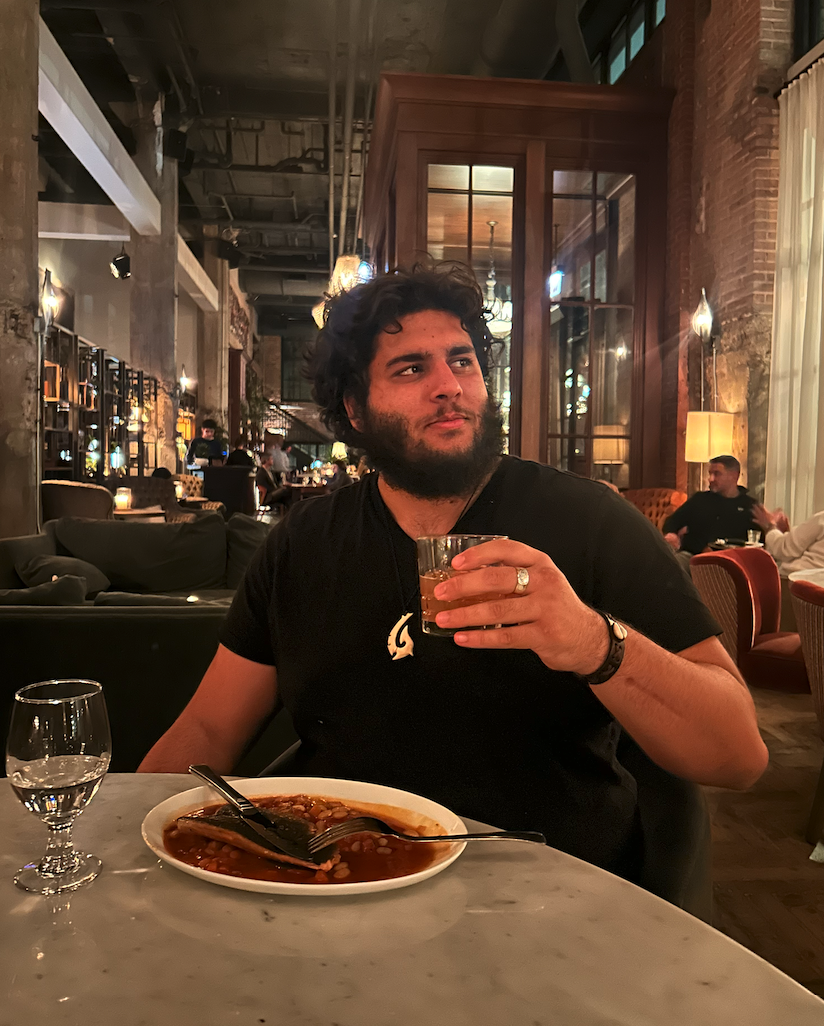Dining Alone: Developing the Skill of Appreciation
Gabriel Thomas
Food is one of the few universal languages, an experience that transcends backgrounds, belief systems, and geography. Whether prepared in a home kitchen or plated in a Michelin-starred dining room, a shared meal has the power to gather people and create the collective memories that form the foundation of any community. I grew up surrounded by the idea that cooking is an act of love. Both sides of my family expressed care not through grand speeches, but through simmering pans and passed plates. Some of my most cherished memories are of being in the kitchen alongside people I love—tasting, adjusting, laughing, eating.
But this past year, I began exploring a different side of food culture: dining alone.
It began somewhat accidentally. After finishing my first quarter at UChicago, I decided to treat myself to a celebratory dinner with money I had won playing poker. My friends had already left for winter break, so I booked a solo late-dinner reservation at Boka: a small, one-Michelin-starred restaurant tucked into Chicago’s Lincoln Park. I didn’t think much about the fact that I would be dining alone. I simply wanted to experience something special.
I was seated at a corner table near a window, with a view of the surrounding neighborhood on this quiet and peaceful Chicago night. The lights were dimmed, the room murmured with the last small clusters of guests, and my phone stayed tucked firmly away. Despite this calm atmosphere, I was feeling very energized with excitement. This was the first time I was going to experience a Michelin meal.
When the first dish arrived (scallops with brown butter foam, green apple, and puffed rye berries), I felt a rush of anticipation. But the moment I took that first bite, something unexpected happened. The world slowed. All of the energy I was feeling settled, and I simply experienced.
Freed from conversation and performance, I found myself tasting deeply. The scallops unfolded in layers: sweet, then savory, then faintly nutty from the brown butter. The bright acidity of the apple flickered in and out. The rye offered texture and warmth. Each chew revealed something new. It felt almost meditative—no distraction, no hurry, just flavor and presence.
I ate slowly. I let each bite linger. I paid attention.
The meal stretched across two unhurried hours and three courses, and when I left, I felt as though something fundamental had shifted. I can still reconstruct those bites in my memory; Boka’s sensory imprint is just that strong.
Since my Boka experience, I’ve continued to dine alone at restaurants where the food asks to be noticed. I’ve always considered myself a “foodie,” but this practice, this intentional solitude, has deepened that identity. Dining alone has allowed me to experience food with what feels like heightened clarity. I no longer just eat, I observe, savor, and listen. The food becomes not just nourishment or entertainment, but a conversation between ingredients, technique, season, and my own attention.
In a culture that often prizes speed, multitasking, and constant stimulation, choosing to slow down and taste requires intentionality. Making space for solitude, whether over a bowl of noodles or a tasting menu, has taught me to approach experiences with more intention—to let beauty reveal itself at its own pace.
Food is a uniquely complete teacher of this practice. When done right, food stimulates every aspect of the senses, and even a few of the mind. Sight, smell, sensation, noise, taste, memory, association, and more all come together in the experience. Without active concentration, it can be easy to miss some of these crucial elements. Ultimately, dining alone has taught me that appreciation is not passive. It is a skill, one that deepens with intentional practice.
Solo dining

